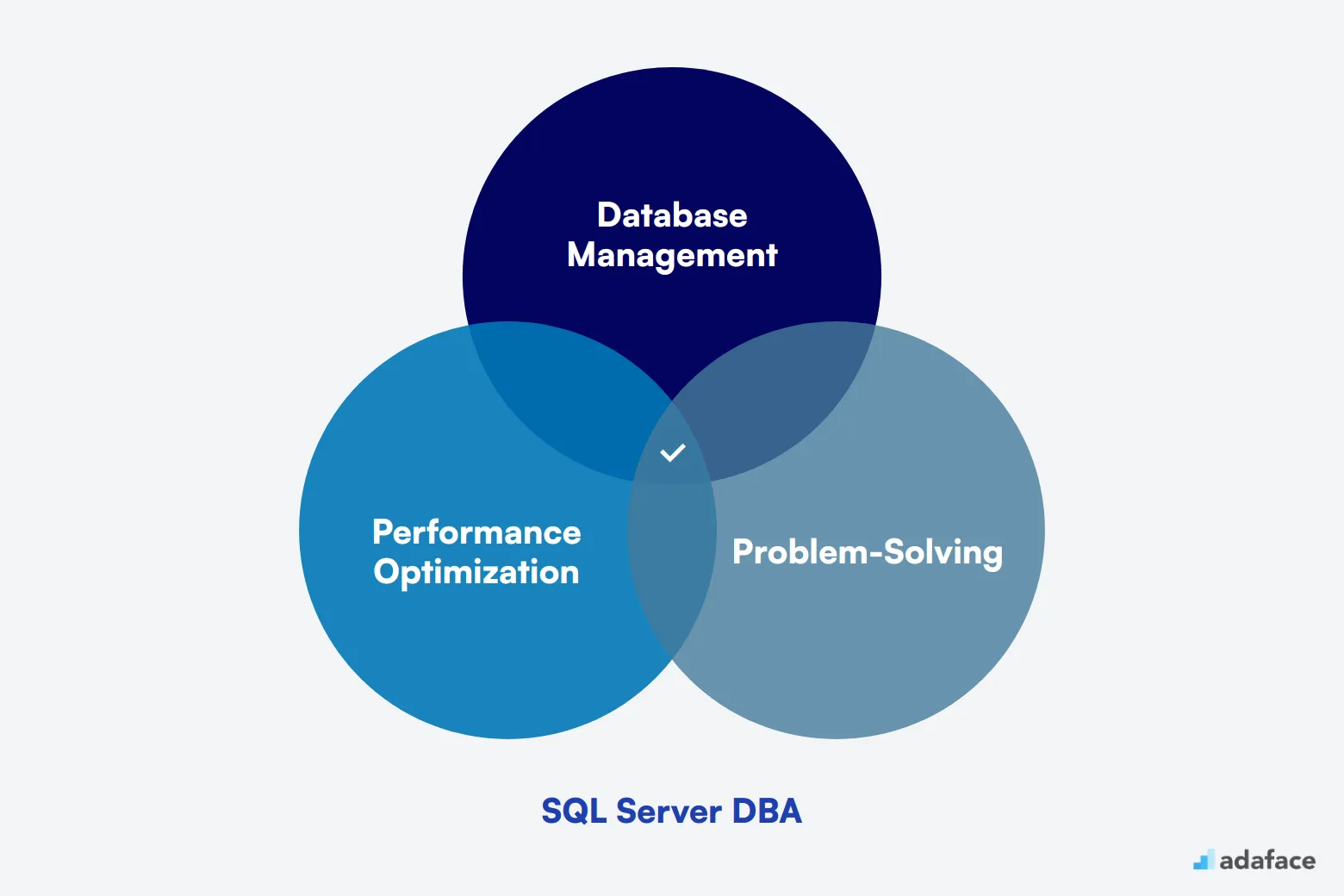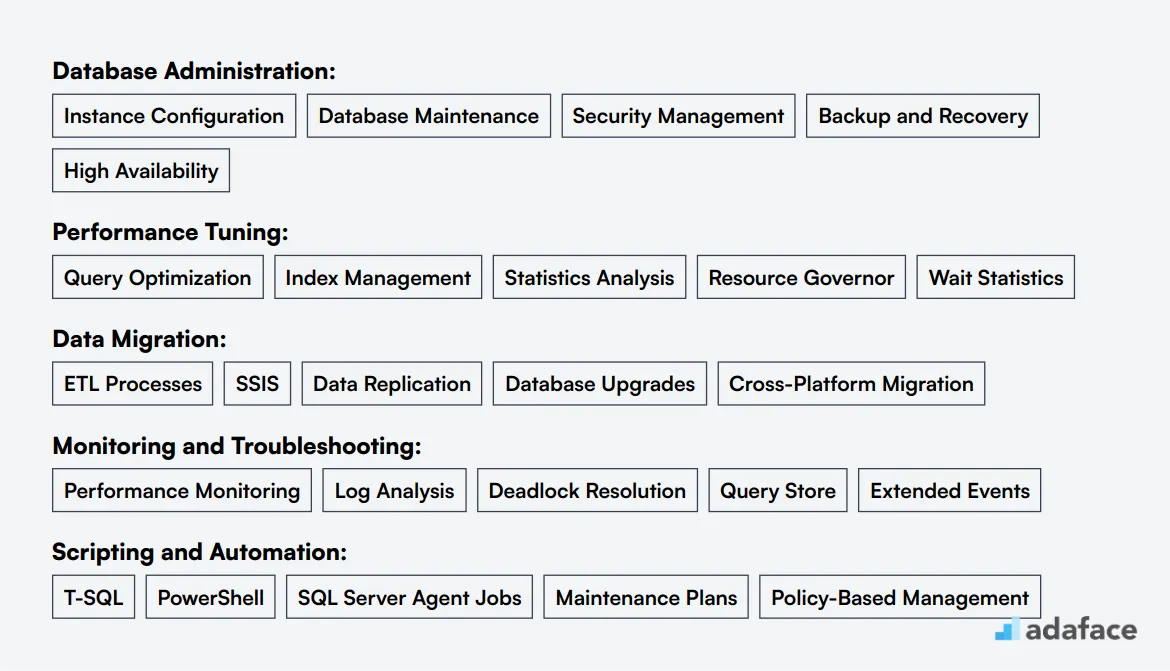In today's data-driven world, hiring a SQL Server DBA is more than just filling a position—it's about safeguarding your organization's database integrity and optimizing performance. Many companies mistakenly hire based on technical skills alone, overlooking the importance of problem-solving abilities and communication skills in a DBA role. A SQL Server DBA must not only manage data but also be adept at collaborating with teams to implement database solutions that align with business goals.
This guide offers insights into hiring a top-tier SQL Server DBA, detailing key skills, the hiring process, and practical tips on crafting effective job descriptions. You'll also find information on using skill assessments to evaluate candidates, as well as strategies for structuring interviews to identify the best talent.
Table of contents
Why Hire a SQL Server DBA?
Hiring a SQL Server Database Administrator (DBA) becomes necessary when your organization faces database-related challenges. For instance, if you're experiencing slow query performance, data integrity issues, or struggling with database backups and recovery, it's time to consider bringing a SQL Server DBA on board.
A skilled SQL Server DBA can help optimize database performance, implement security measures, and ensure high availability of your data systems. They can also assist with database design, capacity planning, and troubleshooting complex SQL Server issues.
Before committing to a full-time hire, assess the scope and complexity of your database needs. For smaller projects or temporary requirements, you might consider hiring a consultant or using a skills assessment tool to evaluate potential candidates. However, if you have ongoing, complex database management needs, a full-time SQL Server DBA can provide long-term value to your organization.

SQL Server DBA Hiring Process
The hiring process for a SQL Server DBA typically spans around 6 to 8 weeks, focusing on key steps to ensure you find the right candidate. Here's a streamlined overview of the necessary steps.
- Define the Role: Start with a well-crafted job description that outlines the responsibilities, required skills, and qualifications. This sets the foundation for attracting suitable candidates.
- Post the Job: Share the job listing on relevant job boards and your company website. Expect to see applications rolling in within the first week.
- Review Resumes: Shortlist candidates based on their qualifications and experience, aiming to narrow your list in about 5 days.
- Skill Assessment: Conduct technical assessments or coding tests to evaluate their abilities. This phase can take about a week to complete.
- Interviews: Schedule interviews with the top candidates, allowing for both technical and behavioral assessments. This might take an additional 1-2 weeks.
- Final Offer: After selecting the best candidate, move to the offer stage. You should finalize and extend the offer within a week.
In summary, the overall hiring timeline usually ranges from 6 to 8 weeks, depending on your efficiency at each step. Prepare for an influx of applications early on, and expect to invest time in both assessments and interviews. With these steps outlined, we will explore each component further to help you streamline your hiring process.
Key Skills and Qualifications for a SQL Server DBA
Hiring a SQL Server DBA can be challenging, especially when defining the candidate profile. It's crucial to differentiate between must-have and nice-to-have skills, as one company's requirements may differ significantly from another's. Misinterpretation of these needs can lead to suboptimal hiring choices.
When creating your candidate profile, it's helpful to categorize skills into required and preferred. This will guide you in identifying candidates who not only meet the basic criteria but also bring additional value to your team.
| Required skills and qualifications | Preferred skills and qualifications |
|---|---|
| 5+ years of experience as a SQL Server DBA | Certification in Microsoft SQL Server (e.g., MCSE: Data Management and Analytics) |
| Proficiency in SQL Server administration, maintenance, and troubleshooting | Experience with cloud platforms (Azure, AWS) |
| Experience with backup and recovery strategies | Knowledge of PowerShell scripting |
| Knowledge of performance tuning and query optimization | Familiarity with business intelligence and data warehousing concepts |
| Familiarity with high availability and disaster recovery solutions | Experience with database security and compliance |
How to write a SQL Server DBA job description?
Once you have a candidate profile ready, the next step is to capture that information in the job description to attract the right candidates. A well-crafted SQL Server DBA job description can make a significant difference in attracting qualified applicants.
- Highlight key responsibilities and impact: Clearly define the role's responsibilities, such as database design, performance tuning, and ensuring data security. Explain how their work will support the organization's overall goals. This clarity will appeal to candidates who are looking to make a meaningful contribution.
- Balance technical skills and certifications with soft skills and industry expertise: While noting requirements like proficiency in SQL Server, experience with T-SQL, and relevant certifications (such as Microsoft Certified: Azure Database Administrator Associate), don't forget to mention soft skills like problem-solving, communication, and teamwork. A balanced job description ensures you attract well-rounded candidates. For more specifics, refer to our SQL Server Database Administrator job description.
- Showcase company and role's unique selling points: Highlight what makes your company and the DBA role unique. Whether it’s innovative projects, opportunities for career growth, or a collaborative environment, these details can set you apart from competitors and appeal to top talent.
Top Platforms to Hire SQL Server DBAs
Now that you have a solid job description, it's time to post it on job listing sites to attract qualified SQL Server DBA candidates. The right platform can make a significant difference in finding the best talent for your organization.
LinkedIn Jobs
Ideal for posting full-time SQL Server DBA positions. Offers wide reach and allows detailed job descriptions with company profiles.

Indeed
Excellent for posting a variety of SQL Server DBA roles. Provides options for sponsored listings to increase visibility.

Dice
Specialized job board for tech roles. Ideal for reaching experienced SQL Server DBAs and IT professionals.

Beyond these popular sites, there are specialized platforms catering to specific hiring needs. Freelance platforms like Upwork and Toptal are excellent for project-based work or finding elite freelancers. For remote positions, FlexJobs is a go-to resource, while AngelList is perfect for startups looking to hire innovative DBAs. Staffing agencies like Robert Half can also provide valuable assistance in recruiting and vetting SQL Server DBAs.
Keywords to Look for in SQL Server DBA Resume
Screening resumes is a critical first step in narrowing down the pool of candidates for a SQL Server DBA position. Given the technical nature of this role, identifying key skills and qualifications upfront helps in focusing on candidates who meet the job requirements.

When manually screening resumes, keep an eye out for specific keywords related to the candidate’s experience and skills. Look for mentions of SQL Server administration, performance tuning, and disaster recovery solutions. Candidates should also have experience with backup and recovery strategies, and mention familiarity with high availability concepts.
Using AI language models can streamline your screening process by scanning for relevant skills and qualifications quickly. By giving the AI a set of keywords to look for, such as PowerShell scripting and cloud platform experience, you can automate part of the initial evaluation. Tools like Adaface's online assessment platform can help integrate these capabilities into your recruitment workflow.
Here's a sample AI prompt you can use:
INPUT: Resumes
OUTPUT: For each resume, provide following information:
- Email ID
- Name
- Matching keywords
- Score (out of 10 based on keywords matched)
- Recommendation (detailed recommendation for shortlisting)
- Shortlist (Yes, No, or Maybe)
RULES:
- If unsure about a candidate's fit, mark as Maybe
- Keep recommendations short and concise.
KEYWORDS DATA:
- Database Administration (Instance Configuration, Backup and Recovery)
- Performance Tuning (Query Optimization, Index Management)
- Scripting and Automation (T-SQL, PowerShell)
By utilizing such prompts, you can efficiently filter resumes to find candidates who stand out. For more details, explore SQL Server DBA job descriptions to ensure alignment with your hiring needs.
Recommended Skills Tests for SQL Server DBAs
Skills tests are a great way to evaluate SQL Server DBA candidates beyond their resumes. They provide objective insights into a candidate's technical abilities and problem-solving skills. Here are some key skills tests we recommend for assessing SQL Server DBAs:
SQL Server Test: This SQL Server online test evaluates a candidate's proficiency in managing and optimizing SQL Server databases. It covers topics like query optimization, index management, and database security.
T-SQL Test: A T-SQL test assesses a candidate's ability to write complex queries, stored procedures, and functions. This is important for DBAs who need to create and maintain database objects.
System Administration Test: SQL Server DBAs need to understand server management and infrastructure. A system administration test can help evaluate their knowledge of Windows Server, networking, and security concepts.
Data Modeling Test: Effective database design is critical for performance and scalability. A data modeling test can assess a candidate's ability to create efficient database schemas and relationships.
Data Warehouse Test: For organizations using SQL Server for business intelligence, a data warehouse test can evaluate a candidate's understanding of data warehousing concepts and SQL Server's BI tools.
Case Study Assignments to Hire SQL Server DBAs
Case study assignments are a dual-edged sword when hiring SQL Server DBAs. While they effectively assess a candidate's real-world skills, they can also be daunting due to their length. This often leads to lower completion rates and the risk of missing out on talented candidates who might be discouraged by the time commitment. Here are some sample case studies to consider, each designed to gauge different aspects of a DBA's expertise.
Database Performance Analysis: This case study focuses on evaluating a candidate's ability to analyze and optimize database performance. Candidates are tasked with identifying bottlenecks in a given database scenario and providing solutions to enhance efficiency. It's an excellent way to assess their problem-solving skills and understanding of performance tuning.
Backup and Recovery Plan Design: In this assignment, candidates are required to create a comprehensive backup and recovery strategy for a hypothetical company. This tests their knowledge of SQL Server backup options and disaster recovery processes, ensuring they can safeguard data integrity and minimize downtime.
Data Security Assessment: Candidates are asked to conduct a security audit on a sample database and recommend improvements. This exercise evaluates their understanding of data security protocols and ability to implement protective measures. To learn more about skills related to this, visit skills-required-for-sql-server-database-adminstrator.
How to structure interview stage for hiring SQL Server DBAs?
Once candidates pass the skills tests, it's time to take them to the technical interview stage where their hard skills will be assessed. While skills tests are great for filtering out unfit candidates, the interview stage helps identify those truly suited for the SQL Server DBA role. This stage allows you to explore the depth of their expertise and problem-solving abilities.
Here are some interview questions to consider: What experience do you have with SQL Server upgrades and migrations? This question helps determine their practical experience with real-world scenarios. Can you explain how you would handle a database performance issue? Understanding their troubleshooting approach is key. Describe how you ensure database security and data protection. This question evaluates their awareness of security measures. How do you implement backups and disaster recovery plans? It’s important they have a strategy for data resilience. Lastly, What is your experience with T-SQL programming? This assesses their proficiency in the SQL language and query optimization.
What's the difference between a SQL Server DBA and a Database Developer?
Many people often confuse a SQL Server DBA with a Database Developer, as both roles involve working with databases. However, the primary focus and responsibilities of each role are distinct, leading to different skill sets.
A SQL Server DBA primarily focuses on database administration, which includes tasks such as backup, recovery, security, and performance tuning. They typically work in a production environment and are responsible for ensuring database uptime and data integrity. Their key skills include troubleshooting and performance optimization, and they often have a background in Information Technology or Computer Science.
In contrast, a Database Developer is focused on database development, which entails designing, implementing, and optimizing database systems. They typically operate in a development environment, delivering new database features and schema modifications. Database Developers usually have a background in Software Engineering or Computer Science and possess skills in database coding and software development.
In summary, while both roles are essential for managing databases, the SQL Server DBA leans more towards administration and maintenance, whereas the Database Developer is centered on creating and improving database functionalities. Understanding these differences can help recruiters identify the right talent for their specific needs. For more insights on the skills required for a SQL Server Database Administrator, you can visit this resource.
| SQL Server DBA | Database Developer | |
|---|---|---|
| Primary Focus | Database Administration | Database Development |
| Core Responsibilities | Backup, Recovery, Security, Performance Tuning | Design, Implement, Optimize Database Systems |
| Tools Used | SQL Server Management Studio, Azure Data Studio | SQL Server Data Tools, Visual Studio |
| Typical Work Environment | Production Environment | Development Environment |
| Typical Deliverables | Ensuring Database Uptime, Data Integrity | New Database Features, Schema Modifications |
| Educational Background | Information Technology, Computer Science | Software Engineering, Computer Science |
| Experience Level | Often Mid-Level to Senior | Entry-Level to Mid-Level |
| Key Skills | Troubleshooting, Performance Optimization | Database Coding, Software Development |
What are the ranks of SQL Server DBAs?
Many organizations have a tiered structure for SQL Server Database Administrators (DBAs). This hierarchy helps in career progression and defines responsibilities based on experience and expertise.
- Junior DBA: Entry-level position for those new to database administration. They handle basic tasks like backups, monitoring, and simple troubleshooting under supervision.
- DBA: Mid-level position with more responsibilities. They manage database performance, security, and conduct more complex troubleshooting independently.
- Senior DBA: Experienced professionals who lead database projects, mentor junior staff, and make critical decisions about database architecture and strategy.
- Principal DBA: Top-tier position overseeing enterprise-wide database operations. They often contribute to business strategy and technology decisions.
- Database Architect: While not strictly a DBA rank, this role often evolves from senior DBA positions. They focus on designing and planning database systems across the organization.
Hire the Best SQL Server DBAs
Throughout this guide, we've explored the ins and outs of hiring a SQL Server DBA, from understanding their roles and responsibilities to writing effective job descriptions. We've also delved into the recruitment process, identifying key skills, and structuring interviews to ensure you attract and select top talent for your organization.
If there's one key takeaway from this guide, it is the importance of crafting precise job descriptions and utilizing skill assessments to enhance your hiring accuracy. Implementing targeted skills tests, such as the SQL Server Online Test, can significantly streamline your recruitment process, ensuring you hire the right SQL Server DBAs who meet your organization's needs.
SQL Server Online Test
FAQs
A SQL Server DBA is responsible for the management, maintenance, and security of SQL Server databases, ensuring optimal performance and data integrity.
Important skills for a SQL Server DBA include expertise in SQL Server architecture, performance tuning, backup and recovery strategies, and strong communication skills.
You can assess a candidate's skills by using skill tests such as the SQL Server Online Test and conducting technical interviews focused on problem-solving capabilities.
Popular platforms for hiring SQL Server DBAs include LinkedIn, specialized job boards, and recruitment agencies with a focus on IT roles.
A SQL Server DBA job description should clearly outline responsibilities, required skills, and experience levels. It should also highlight company culture and growth opportunities.
A SQL Server DBA primarily focuses on database maintenance and security, while a Database Developer focuses on designing and implementing database applications and solutions.
Common interview questions for SQL Server DBAs include scenarios on performance tuning, backup strategies, and problem-solving with complex queries.

40 min skill tests.
No trick questions.
Accurate shortlisting.
We make it easy for you to find the best candidates in your pipeline with a 40 min skills test.
Try for freeRelated posts
Free resources



